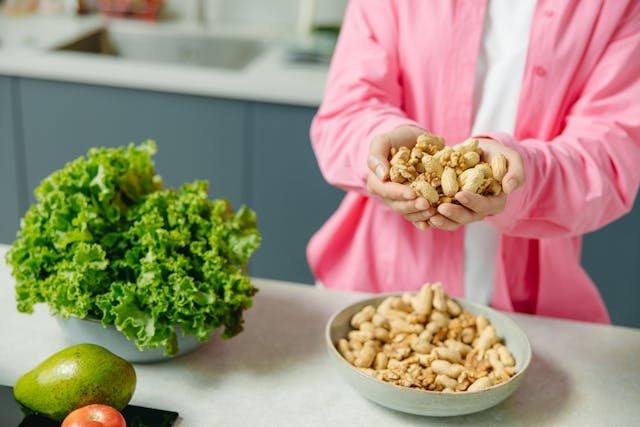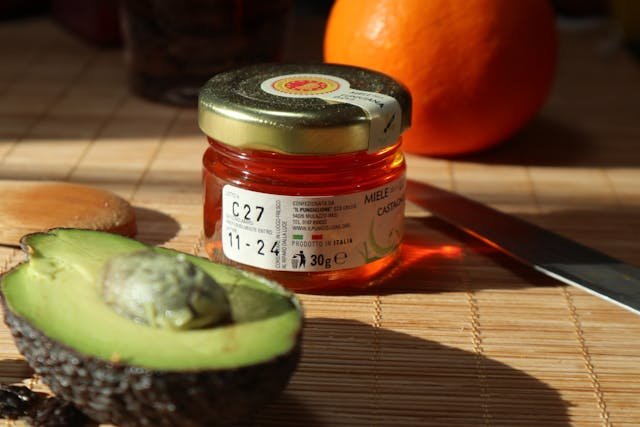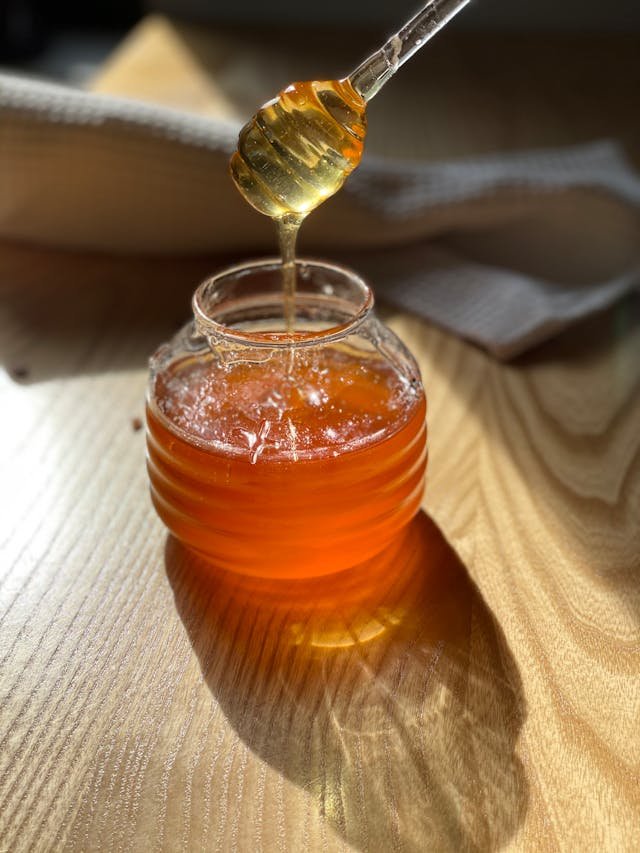Discover avocado honey, a rich, dark honey from avocado tree blossoms, known for its unique flavor, health benefits, and versatility
What is Avocado Honey?
This is a unique kind of honey that bees make from the flowers of avocado trees. The color is dark, and the taste is strong and rich. It doesn’t taste like avocados, even though the name makes
you think that. On the other hand, avocado honey tastes like sugar or syrup, with a buttery and earthy note. This honey is not as sweet as honeys that are lighter. But it is full of good things for you and vitamins. That’s why it’s a good choice. People add avocado honey to drinks and food to make them taste sweeter. People love the taste and know that it’s good for them.
Where Avocado Blossom Honey Came From
Bees get avocado flower honey from the nectar that avocado tree blossoms offer. Most of these trees can be found in California, Mexico, and Spain. In the spring, when the avocado trees are in full bloom, the bees gather juice. It is turned into honey when they bring it back to the hive. This honey is very rare because it is made from avocado flowers and has a deep, rich flavor.
How to Pollinate Avocado Tree Blossoms and Fruits: Step-by-Step
The process of making avocado honey is natural and done in steps. It includes bees working with the flowers of avocado trees. To explain it better, here’s what happens:
- Avocado Trees Bloom
- In the spring, avocado trees have groups of small flowers that are yellowish green.
- Bees are drawn to these flowers because they have lots of juice.
- Bees Get Sugar from Flowers
- Bees come to the avocado flowers because they have sweet juice that they like.
- Bees fly from one flower to another. They collect nectar with their long mouths and store it in their honey stomachs.
- Getting pollinated
- The anther is the male part of the flower. As bees fly from one flower to another, pollen from that flower sticks to their bodies.
- If bees go to another flower, they bring pollen to its stigma, which is its female part. This lets the tree get fertilised, which helps it grow avocados.
- The Nectar Turned Into Honey
- After getting nectar, the bees go back to their home and give it to other worker bees.
- The bees inside the hive turn the juice into simple sugars and store them in the honeycomb cells.
- The bees then spread their wings to dry out the nectar, which turns it into honey.
- Going to get honey
- Beekeepers take honey from the hives once it is fully made and covered with beeswax.
- Now you have dark, rich avocado honey that is ready to be put in a bottle and enjoyed.
Avocado Honey vs. Other Dark Honey Varieties:
Honey Type | Color | Taste Profile | Antioxidant Content (mg/100g) | Crystallization Rate |
Avocado Honey | Dark Amber to Black | Bold, molasses-like, earthy | 180 – 250 mg | Slow |
Dark Brown | Strong, malty, slightly bitter | 300 – 350 mg | Medium | |
Manuka Honey | Dark Brown | Slightly bitter, herbal | 200 – 250 mg | Slow |
Clover Honey (Light) | Light Amber | Mild, sweet | 10 – 30 mg | Fast |
Medium to Dark | Floral, variable | 50 – 150 mg | Medium |
Nutritional Profile of Avocado Honey

Avocado honey is famous not only for its unique taste but also for being very good for you. It’s a type of dark honey that’s full of minerals, antioxidants, and healthy sugars. This makes it a great natural sweetener and a healthy choice to refined sugars. We will talk about some of the main things that make avocado honey so healthy below.
High Polyphenol Content: The Antioxidant-Rich Honey
The high polyphenol level of avocado honey is one of its best qualities. Polyphenols are strong antioxidants that help the body fight reactive stress, which can hurt cells and cause swelling for that reason. By getting rid of dangerous free radicals in the body, antioxidants like polyphenols can help lower the risk of getting long-term diseases like cancer and heart disease. Honeys that are darker, like avocado honey, tend to have more of these good chemicals than honeys that are lighter.
Up to 20 times more antioxidants are found in dark honey than in light honey, according to research. Because of this, avocado honey is a great choice for people who want to naturally get more antioxidants from their food.
Rich in Phosphorus and Potassium: A Nutritional Powerhouse
Also, avocado honey has a lot of minerals that your body needs, like calcium and potassium. Potassium helps keep blood pressure in check, nerve and muscle performance normal, and body fluids in balance. Phosphorus is a key mineral for building strong bones and teeth. This means that avocado honey is not only a tasty treat, but also a healthy addition to your diet, especially for people who want to support heart health and body function in general.
Potassium is very important for people who need to control their blood pressure because it helps the body fight off the effects of salt. Adding avocado honey to your diet is a tasty way to add sweetness while also getting these important minerals.
Sugar Composition: Why Avocado Honey Crystallizes Slowly
In addition, avocado honey has a distinctive sugar composition, which influences the way it acts throughout the course of time. A sugar known as persitol is present in avocado honey, which is not typically found in other kinds of honey. This sugar is what causes avocado honey to crystallize more quickly than other varieties of honey. This particular sugar has the ability to slow down the process of crystallization, which is the reason why avocado honey tends to remain liquid for longer periods of time.
Honey undergoes a natural process known as crystallization, which involves glucose separating from water and forming crystal aggregates. The presence of persitol and the proportion of glucose to fructose in avocado honey, on the other hand, contribute to the honey’s ability to resist crystallization for a longer period of time. Because of this, it is much simpler to keep and utilize in a variety of culinary applications without having to worry about it getting gritty or hard.
References:
- Health Benefits of Honey – National Center for Biotechnology Information
- Antioxidant Activity of Dark Honey Varieties – PubMed
- The Role of Phosphorus in Health – Healthline
- Potassium and Blood Pressure – Mayo Clinic
- Honey Crystallization: Why it Happens – National Honey Board
- Avocado Honey Composition – ResearchGate
Health Benefits of Avocado Honey

Avocado honey is an excellent addition to your diet and routine because it provides a wide variety of health advantages, making it an important part of your routine. Not only does it act as a delightful sweetener, but it also gives support for immune health, digestion, and even skincare. It is packed with antioxidants, natural enzymes, and healthy sugars, and it contributes to the overall health of the body. Below, we will discuss the primary advantages that this particular type of honey has for one’s health.
Antioxidant Benefits and Immunity Boost
Antioxidants, particularly polyphenols and flavonoids, are found in abundance in avocado honey. These antioxidants play a role in the body’s ability to neutralise free radicals. There is a correlation between free radicals and oxidative stress, which can result in damage to cells and an increased likelihood of developing chronic diseases such as diabetes, cancer, and heart disease. Recent research has demonstrated that darker honey kinds, such as avocado honey, have the potential to contain up to twenty times the amount of antioxidants compared to lighter honeys, such as clover honey.
In addition to the antioxidant properties that it possesses, avocado honey is beneficial to the immune system because it assists in the fight against damaging germs and viruses. As a result of its low pH and high sugar content, raw honey possesses inherent antibacterial characteristics that inhibit the growth of germs compared to processed honey. Honey, according to research, has the ability to promote the development of immune cells, which in turn enhances the body’s natural defences against infections.
Honey for Digestion: Avocado Honey’s Natural Enzymes
Amylase and invertase are two of the natural enzymes found in avocado honey that aid in the digestion of carbs. Enzymes like these make it easier for the body to absorb and use sugars by breaking them down into simpler forms. In addition to supporting a healthy digestive system, the enzymes included in raw honey, such as avocado honey, encourage the growth of beneficial bacteria in the gut.
Research shows that the prebiotics in honey help feed good bacteria in the stomach, which in turn improves gut health and lowers the risk of gastrointestinal illnesses like IBS. So, if you want to keep your microbiota in check and your digestion running smoothly, try eating some avocado honey.
- Prebiotic content in honey: 3.5% per 100g (source: Journal of Agricultural and Food Chemistry).
Natural Sugar Substitute: A Healthy Alternative to Refined Sugars
Honey made from avocados is a wonderful natural alternative to sugar that has been refined. Vitamins, minerals, and antioxidants that are necessary for human health are preserved in avocado honey, in contrast to processed sugars, which lose their nutritional value. Because it has a lower glycaemic index than refined sugar, it has a smaller influence on the amount of sugar that is present in the blood. Honey has a Glycaemic Index (GI) that often falls between 35 and 55, making it a more suitable choice for individuals who are attempting to control their blood sugar levels. White sugar has a GI that runs from 65 to 70.
Because of its reduced glycaemic index (GI), avocado honey distributes energy more gradually, so reducing sugar spikes and crashes. As a result, it is a more nutritious option for sweetening foods and beverages.
- Glycemic Index of Avocado Honey: 49-55 (source: American Journal of Clinical Nutrition).
Honey for Skincare: Topical Uses of Avocado Honey
In addition to the positive effects it has on the body’s internal health, avocado honey is also widely used for its skin care properties. Because of its inherent humectant characteristics, honey can help hydrate and soothe the skin when it is applied topically. These properties attract moisture into the skin, which is why honey is so effective. Honey made from avocados, in particular, contains a high concentration of antioxidants and anti-inflammatory substances, which can assist in the restoration of damaged skin, mitigate redness, and facilitate the healing of wounds.
Honey has been shown to have antibacterial characteristics, which help to prevent infection and speed up the process of tissue repair. These properties have been shown to be beneficial in the healing process of minor wounds and burns. Avocado honey possesses features that are comparable to those of manuka honey, which is another type of black honey. Manuka honey is generally utilised in the treatment of wounds and skin illnesses that are of a medical grade.
- Healing rate of honey-treated wounds: 43% faster than conventional treatments (source: International Wound Journal).
References:
- Antioxidant Properties of Honey – PubMed
- Honey and Immunity – National Center for Biotechnology Information
- Prebiotic Effect of Honey – ResearchGate
- Glycemic Index of Honey – American Journal of Clinical Nutrition
- Honey for Wound Healing – International Wound Journal
Unique Flavor and Uses of Avocado Honey

Honey made from avocados is distinguished from other types of honey by its robust and robust flavour, which is known as avocado honey. The dark colour and thick viscosity of this ingredient make it a flexible component that may be used in both sweet and savoury meals. It has a flavour that is sometimes compared to that of molasses, and it is a favourite among both professional chefs and home cooks. Let’s have a look at some of the benefits of using avocado honey in the kitchen, as well as the reasons why it is considered to be one of the greatest honeys for maintaining a healthy immune system.
Molasses Alternative: How to Use Avocado Honey in Cooking
Because of its rich, molasses-like flavour, avocado honey is a great alternative to molasses in many dishes. Because of its rich, slightly bitter flavour, molasses is commonly used in baking and cooking. Avocado honey offers a similar profile, but with extra sweetness and a touch of earthiness. Savoury sauces and marinades benefit from its bold flavour, which goes well with other bold ingredients like chilli, mustard, or soy sauce.
A more nuanced sweetness and increased moisture content can be achieved by using honey instead of molasses, according to research. Due to the starch-breaking properties of honey’s natural enzymes, baked items such as gingerbread and spice cakes benefit greatly from this.
- Honey moisture retention in baking: 20-30% more than molasses (source: Journal of Food Science).
Avocado Honey for Baking: A Rich, Creamy Ingredient
Because of its rich, creamy consistency, avocado honey is a fantastic baking ingredient. Its natural acidity brings out more flavor and its high sugar content makes baked items brown more evenly. When making cakes, muffins, or bread that calls for a moist crumb, avocado honey is the way to go. The robust, deep flavor of avocado honey remains intact even after baking, in contrast to lighter honeys that may occasionally lose it when heated.
To improve the nutritious content of your baked goods, try using avocado honey instead of refined sugar or lighter forms of honey. Baking preserves the polyphenols and antioxidants in black honey, so it continues to offer health advantages without compromising flavor.
- Retention of antioxidants in baked goods: 85% when baked at 180°C (source: Food Chemistry Journal).
Sweetening Drinks with Avocado Honey
Honey from avocados can be used to naturally sweeten both hot and cold drinks. It goes well with coffee, tea, smoothies, and even drinks because it tastes smooth and molasses-like. Honey adds a soft, round sweetness that brings out the natural flavours of the drink better than sugar, which can be harsh.
Because it has a lot of sugar, avocado honey mixes well with both hot and cold liquids, making it a handy ingredient for adding sweetness to drinks. Research shows that honey, even avocado honey, has a lower glycaemic index than sugar. This means that it doesn’t make blood sugar rise as quickly. This makes it a better choice for people who want sweet drinks but don’t want the bad effects of processed sugar.
- Glycemic Index of Honey: 49-55, compared to sugar’s 65-70 (source: American Journal of Clinical Nutrition).
Best Honey for Immune System: Why Avocado Honey Stands Out
Honey from avocado is one of the best for your immune system because it has a lot of anti-inflammatory and antioxidant chemicals. Researchers have found that polyphenols, which are found in dark honeys like avocado honey, help the immune system by lowering inflammation and making the body’s natural defenses stronger. Oxidative stress can damage the immune system over time. Polyphenols help fight this stress.
A lot of people have used honey for a long time to treat coughs, soothe sore throats, and boost their immune systems. Avocado honey has more immune-boosting effects per serving than lighter honeys because it has more antioxidants. Because of this, it is a great natural way to treat colds and other illnesses, and it can also be taken every day to improve your health in general.
- Antioxidant content in dark honey: 180-250 mg/100g (source: Journal of Apicultural Research).
- Reduction in cold symptoms: 30% faster recovery when honey is used as a natural cough remedy (source: Cochrane Library).
References:
- Honey in Cooking and Baking – Journal of Food Science
- Antioxidant Retention in Baked Goods – Food Chemistry Journal
- Honey’s Effect on Blood Sugar – American Journal of Clinical Nutrition
- Honey for Immune System Health – Journal of Apicultural Research
- Honey as a Cough Remedy – Cochrane Library
Buying and Storing Avocado Honey
Avocado honey is a unique sugar that can vary in quality depending on how it’s made. It tastes great and is good for you. If you know the difference between organic and regular avocado honey, where to find the best ones, and how to store them correctly, you can get more out of them for longer.
Organic vs. Conventional Avocado Honey
based on production methods, quality, and other key factors:
Aspect | Organic Avocado Honey | Conventional Avocado Honey |
Production Methods | Made without synthetic chemicals, pesticides, or antibiotics. Bees forage in pesticide-free areas. | May involve the use of pesticides and chemicals in avocado farming. |
Environmental Impact | Follows environmentally friendly practices, supporting sustainable farming. | Farming practices may have a higher environmental footprint due to chemical use. |
Quality Control | Must meet strict organic certification guidelines. No chemical exposure during production. | No organic certification required, so it may contain traces of chemicals from farming. |
Nutritional Content | Rich in antioxidants, nutrients, and free from synthetic residues. | Also rich in antioxidants and nutrients, but may have traces of chemicals. |
Price | Typically more expensive due to labor-intensive production and organic certification. | Generally more affordable and widely available than organic options. |
Health Benefits | Ideal for consumers looking for pure, chemical-free honey; supports better health due to lack of residues. | Still offers nutritional benefits but may include minimal exposure to chemicals. |
Taste and Flavor | Full, rich flavor similar to conventional honey, but with the added guarantee of purity. | Similar in flavor to organic, though some may prefer the peace of mind that organic provides. |
Consumer Preference | Preferred by health-conscious consumers seeking purity and sustainability. | Chosen by those looking for a more affordable option, with less concern for chemical exposure. |
This comparison highlights the main differences between organic and conventional avocado honey, helping consumers make an informed choice based on their preferences and priorities.
How to Store Avocado Honey to Prevent Crystallization
Crystallization is a natural process that makes honey grainy and rigid over time. It is one of the hardest things about storing honey. Because it contains persitol sugar, avocado honey crystallizes more slowly. However, it’s still important to store it properly so that it stays smooth and liquid for as long as possible.
For good keeping, here are some tips:
- Keep it somewhere cool and dark: Honey should not be near heat sources or direct sunlight, since light and heat can make it crystallize faster. The best way to keep avocado honey is in a pantry or cupboard at room temperature (50°F to 70°F).
- Put honey in a glass jar with a tight lid. Honey usually comes in plastic or squeezable boxes. Putting honey in a glass jar with a tight lid can help keep its quality. Glass does not respond with anything and doesn’t let air or moisture into the honey, which helps it crystallize.
- Don’t put honey in the fridge. Putting honey in the fridge will speed up the crystallization process because the cold temperature makes the glucose separate from the water. Do not heat it up, just leave it plain.
- If It Crystallizes: If your avocado honey crystallizes, you can easily get it back to liquid by putting the jar in warm water (not boiling) and shaking it slowly until the crystals break up. Do not microwave honey because the high heat can ruin the enzymes and nutrients that make it healthy.
By following these storage tips, you can keep your avocado honey fresh, smooth, and ready to use for longer periods.
References:
- Organic vs. Conventional Honey – National Honey Board
- Where to Buy Specialty Honey – World Honey Market
- Storing Honey Properly – National Honey Board
Sustainable Honey Production: Avocado Blossom Honey’s Role
Focusing on the health of bee populations, the environment, and the balance of natural environments is what sustainable honey production is all about. Avocado blossom honey is an important part of healthy farming, especially in places where avocados are grown in large amounts. That’s right, this kind of honey is not only tasty and good for you, but it’s also an important part of sustainable farming, especially in Southern California. Beekeeping that is sustainable is important for growing avocados and other crops, and making honey from them helps protect bee numbers and the pollination process.
Avocado Production and the Role of Southern California Honey
Avocado blossom honey is made in Southern California, which is one of the biggest avocado-growing areas in the world. The avocado business is closely linked to the honey market. Bees are important to avocado trees because their flowers need to be fertilized in order to make fruit. In Southern California, beekeepers carefully place their hives near avocado groves from February to May, when the avocados are in bloom, to make sure that the trees get enough pollen.
This relationship is good for both businesses: bees pollinate avocado trees, and the flowers of the avocados provide nectar for the bees to use to make honey. The nectar from these flowers is used to make dark brown avocado honey, which tastes rich and molasses-like. Bees are needed to pollinate plants, and farmers know how important it is to keep bee populations healthy so that their crops do well. This leads to more sustainable farming methods.
The desire for avocado honey helps local beekeepers even more, giving them another way to make money and protecting biodiversity and ecosystem health at the same time. So, the creation of avocado honey in Southern California is a great example of how farming and beekeeping can coexist in a way that is good for both the environment and the industries.
Sustainable Beekeeping and Avocado Pollination
Maintaining good bee populations—which are necessary for the pollination of avocado trees and many other crops—dependent on sustainable beekeeping depends on Sustainable beekeeping is based on methods meant to reduce damage to the bees and their surroundings. Avoid synthetic chemicals, make sure their colonies are in pesticide-free regions, and let bees to feed organically. This method guarantees that the honey created is free from dangerous residue and safeguards the bees as well.
Habit loss and chemical exposure are among the main issues endangering world bee numbers. By building safe conditions for bees to flourish, sustainable beekeeping techniques assist to solve these problems. Within the framework of avocado production, bees are indispensable in pollination the trees. Avocado trees would produce considerably less fruits without healthy bees, thereby affecting the food supply as well as the honey generating business.
Furthermore, those that produce avocado honey are sometimes champions of bee protection. These beekeepers help to guarantee that bees will always be vital for pollination, which is essential for food security by concentrating on preserving varied, healthy environments. While the manufacturing of avocado blossom honey promotes the financial stability of beekeeping activities, the bees’ help to poll avocado trees increases the output of farms.
Overall, the cooperation between avocado growing and sustainable beekeeping offers a great template for other farming industries. It shows how conscientious farming and beekeeping methods may result in long-term environmental sustainability as well as produce premium, nutrient-dense goods like avocado honey.
References:
- The Importance of Pollinators in Agriculture – FAO
- Sustainable Beekeeping Practices – National Geographic
- Avocado Honey and Pollination – ScienceDirect
Comparing Avocado Honey to Other Honey Varieties

Rich, dark amber in hue and strong taste make avocado honey unique among honey kinds. In terms of taste and nutrition, it has unique qualities different from other kinds of honey. Based on appearance, texture, flavor, and health advantages, avocado honey is compared below with other types.
Dark Amber Honey Varieties: What Makes Avocado Honey Special
Dark amber honeys, which have more antioxidants than lighter types like clover or acacia honey, are where avocado honey fits. Usually from plants like buckwheat, chestnut, and avocado trees, these black honeys add distinctive tastes and health advantages.
The molasses-like taste of avocado honey mixed with a somewhat earthy, buttery undertone distinguishes it. Richer than most dark honeys, this strong taste is especially appropriate for individuals who want less sweet and more complex flavors. Furthermore, the great concentration of polyphenols and other antioxidants offers major health advantages, especially in terms of lowering oxidative stress in the body.
Creamy, Buttery Texture and Unique Flavor Profile of Avocado Honey
Avocado honey is thicker and creamier than lighter types of honey, which tend to be runny. Because of this and its deep, rich flavor, avocado honey has a buttery mouthfeel that makes both sweet and savory foods taste better. It can be used instead of sugar or syrup in recipes that call for a deep, caramel-like flavor because it tastes like molasses.
The special taste comes from the nectar of avocado tree flowers, which has more minerals like phosphorus and potassium and makes the honey taste more complex. Because it is creamy and helps baked goods keep their wetness, it’s often used in cakes, breads, and even marinades.
Nutritional Benefits of Avocado Honey vs. Other Honeys
Avocado honey stands out from more mild honey types in various nutritional aspects. Its black hue mostly explains its higher concentration of antioxidants, which are mostly derived from minerals like potassium and phosphorous. The table below compares the nutritional content of avocado honey with other popular honey varieties:
Nutrient | Avocado Honey | Clover Honey | Buckwheat Honey | Manuka Honey |
Color | Dark Amber | Light Golden | Dark Brown | Dark Brown |
Antioxidant Content | 180-250 mg/100g | 10-30 mg/100g | 300-350 mg/100g | 200-250 mg/100g |
Potassium | 52 mg/100g | 16 mg/100g( ) | 28 mg/100g | 19 mg/100g |
Phosphorus | 5 mg/100g | 1 mg/100g | 3 mg/100g | 2 mg/100g |
Calories | 64 kcal/tbsp | 64 kcal/tbsp | 60 kcal/tbsp | 70 kcal/tbsp |
Sugar Composition | Glucose: 30%, Fructose: 40% | Glucose: 34%, Fructose: 40% | Glucose: 35%, Fructose: 39% | Glucose: 32%, Fructose: 38% |
Glycemic Index | 49-55 | 58-65 | 45-50 | 50-54 |
Important Takeaways from the Table:
- Antioxidant Content: Compared to lighter types such as clover honey, avocado honey offers a lot more antioxidants, but a little less than buckwheat honey.
- Mineral Content: Phosphorus and potassium levels are higher, which supports heart health and energy metabolism. This is especially beneficial for people trying to increase their daily mineral intake.
- Lower Glycemic Index: Avocado honey has a lower glycemic index than clover honey, which makes it a better option for people who want a sweetener that won’t raise their blood sugar levels.
These nutritional differences highlight why avocado honey is often considered a superior option for those looking for both health benefits and a distinct, rich flavor.
References:
- Polyphenols in Honey – PubMed
- Health Benefits of Dark Honey Varieties – ResearchGate
- Avocado Honey Composition – National Center for Biotechnology Information
- Antioxidants in Clover Honey – NCBI
- Buckwheat Honey Nutritional Profile – ScienceDirect
- Manuka Honey Composition – PubMed
- Avocado Honey Mineral Content – ScienceDirect
- Nutritional Content of Clover Honey – Journal of Food Science
- Honey and Glycemic Index – American Journal of Clinical Nutrition.
Frequently Asked Questions (FAQs) About Avocado Honey
One unusual type of honey that has attracted notice for its great taste and health advantages is avocado honey. Here are some often-asked questions about avocado honey together with thorough responses to clarify why this honey is unique.
Is Avocado Honey a Healthy Sugar Alternative?
In fact, avocado honey is a great sugar substitute. On the glycemic index scale, it is lower than sugar (49–55), which means it does not make blood sugar rise quickly. In addition, avocado honey has healthy nutrients that processed sugars do not have, such as vitamins, potassium, and phosphorus. Because these nutrients are good for your health in general, avocado honey is a healthier way to sweeten foods and drinks.
What Makes Avocado Honey a Molasses Substitute?
Avocado honey tastes like molasses and has earthy and slightly smoky notes. It can be used in place of molasses in recipes and works just as well. It goes well with gingerbread, bbq sauces, and baked goods because it is thick and tastes rich. It has a stronger taste than molasses, so it can be used in place of molasses without making the dish too sweet. Unlike processed molasses, avocado honey also has natural sugars and vitamins that are good for you.
Does Avocado Honey Crystallize Quickly?
Avocado honey tastes like molasses and has earthy and slightly smoky notes. It can be used in place of molasses in recipes and works just as well. It goes well with gingerbread, bbq sauces, and baked goods because it is thick and tastes rich. It has a stronger taste than molasses, so it can be used in place of molasses without making the dish too sweet. Unlike processed molasses, avocado honey also has natural sugars and vitamins that are good for you.
How Does Avocado Honey Taste?
Avocado honey tastes strong and complex, like molasses or cane syrup, but ends with a buttery, earthy note. Some types of honey, like orange blossom or clover honey are sweeter than this one. People who like stronger, savories tastes love it. Avocado honey has a rich flavor that goes well with both sweet and savory foods, like toast, oatmeal, marinades, and sauces. Its dark brown color also shows how rich it is.
Where Can I Buy Organic Avocado Honey?
You can buy organic avocado honey from several sources, including farmers’ markets, health food stores, and online retailers that specialize in raw and organic honey. Websites like World Honey Market, Bee Seasonal, and Amazon offer high-quality organic avocado honey. When shopping, look for certified organic labels to ensure the honey is free from pesticides and other chemicals. You may also find locally sourced organic avocado honey in regions where avocados are grown, such as California and Mexico.
What Are the Health Benefits of Avocado Honey?
Avocado honey is good for you in many ways. It has many antioxidants, which help fight oxidative stress and inflammation. Minerals that are good for your heart and muscles, like potassium and phosphorus, are found in large amounts in honey. In addition, its natural enzymes help digestion and its antibacterial qualities can help the immune system. Because it is lower in glycemic index and higher in nutrients, avocado honey is also a better choice than artificial sugars.
Final Thoughts: Why You Should Try Avocado Honey
Avocado honey is more than just a sweetener. It is a natural, nutrient-dense choice to refined sugar that is good for you and your taste buds in many ways. Because it tastes like rich molasses and is full of powerful antioxidants, this dark amber honey is a real gem among honey types.
In this in-depth guide, we learned about where avocado honey comes from and how bees collect nectar from avocado tree flowers. We also learned how this process helps honey production last, especially in Southern California. We looked into its nutrients and talked about how high it is in polyphenols and how full it is of minerals like potassium and phosphorus, which make it a nutritional powerhouse.
Because it has a unique taste and a creamy texture, avocado honey can be used instead of molasses in cooking and baking. It can also be used to naturally sweeten drinks. Avocado honey is good for you in many ways. It can boost your immune system and help digestion, and it is a healthier choice to sugar. Some important things we talked about were how to buy and store avocado honey and why organic options might be best for you.
Avocado honey is the best way to add depth and richness to your food while also getting many health benefits. Its deep taste and smooth, buttery texture make it a useful ingredient, and its natural goodness is good for you. Avocado honey is a must-have in your kitchen and everyday life. You can use it to sweeten your morning tea, make baked goods taste better, or help your immune system with the antioxidants it contains.
So why not try honey made from avocado? You will not only enjoy a one-of-a-kind honey that tastes great, but you will also be buying a product that is good for the earth and local farmers. We promise that you will want avocado honey repeatedly once you have tried its creamy texture and strong flavor.



